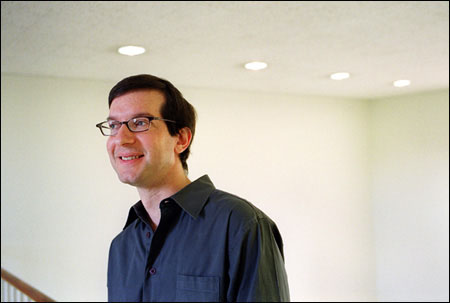Unfulfilled plans make fulfilling field:
Economist Laibson gets inside people’s heads, wallets

A snippet from the children’s book “Frog and Toad are Friends” is posted on the bulletin board outside David Laibson’s Littauer Center office.
Toad woke up.
“Drat!” he said
“This house is such a mess. I have so much work to do.”
Frog looked through the window.
“Toad, you are right,” said Frog. “It is a mess.”
Toad pulled the covers over his head.
“I will do it tomorrow. Today I will take life easy.”
The book perfectly captures the spirit, not of frogs and toads, but as with any good children’s book, of people. And, oddly enough, of economics.
How many people know they should save regularly, plan for retirement, and keep credit card debt down? And how many just pull the covers over their heads – and go out to dinner – week after week, after taking a look at their finances?
“Toad, you are right,” we can hear ourselves intone. “It is a mess.”
Laibson, the newly promoted professor of economics, specializes in psychology and economics, a field that incorporates the messiness of the human condition into economic models. The field is relatively new but has gained many converts over the past two decades. Daniel Kahneman won this year’s Nobel Prize in economics for pioneering work in the field.
“There are all these psychological issues that affect economics, but economics has tended to ignore those issues, to focus on economic motives,” Laibson said. “There is no self-control problem in standard economics.”
Laibson himself focuses on the economics of things near and dear to the consumer’s heart, like credit cards, retirement savings, mortgage refinancing, all colored by things like temptation, self-control, and impulsiveness.
New work on which he is just embarking is looking at how genetics affects economic behavior. Scientists believe behavior is about half due to inheritable traits and half to environment. Laibson, working with Economics Professor Edward Glaeser, postdoctoral fellow in psychology Chris Chabris, and doctoral student Dan Benjamin, is looking for simple relationships between economic behavior and a single gene or small group of genes.
“The question is not do genes play a role in driving your behavior, the question is how,” Laibson said.
Economics Department Chairman Oliver Hart, the Andrew E. Furer Professor of Economics, praised Laibson for his creativity and enthusiasm for teaching work.
“David is a creative economist, with an exciting research agenda, and a brilliant teacher,” Hart said. “We are delighted to have him as a senior colleague.”
Much of Laibson’s work focuses on the tension between planning and behavior. Whether it is in credit card use, sticking to a budget, or saving for the future, people face similar problems of self-control and impulsiveness.
“Plans are characterized by ‘doing the right thing,’” Laibson said, citing a list of plans familiar as New Year’s resolutions: exercise more, eat better, quit smoking. “While today I want to do the right thing tomorrow, tomorrow I want instant gratification. What these models predict is that that tension plays out on the household balance sheet in a lot of ways.”
But all is not lost, Laibson said. While we may be inconsistent, we also know what we should be doing. Even as we run up our credit card debt, we have created ways to put money away – Social Security, IRAs, the equity built through home mortgages – in places where it’s safe from our own marauding.
“We’re weak, but we recognize that,” Laibson said. “We develop strategies to organize our lives to achieve our long-term goals.”
Never looked back
Laibson said he loves teaching, a fact reflected in his winning the Phi Beta Kappa Prize for Excellence in Undergraduate Teaching in 1999.
“One of the great pleasures of being here is having excited, brilliant, motivated students,” Laibson said. “Their insight keeps me on my toes all the time and they inform my thinking through their questions.”
Laibson, who studied at Harvard as an undergraduate, became an assistant professor of economics here in 1994, after receiving his doctorate at the Massachusetts Institute of Technology. Before M.I.T., he received a master of science degree in econometrics and mathematical economics from the London School of Economics, where he studied on a Marshall Scholarship.
Laibson acquired a taste for economics not far from where he currently teaches it. As an undergraduate in the mid-1980s, Laibson remembers noticing the nation’s awakening from the economic “malaise” of the late 1970s and thinking he’d get a job on Wall Street. So, fresh after his freshman year, he applied to work on Wall Street, but was rejected.
He wound up working for free at a political science think tank on the University of Pennsylvania campus. He enjoyed his exposure to political economics, so the next summer he got a job as a research assistant for William Joseph Maier Professor of Political Economy Benjamin Friedman. He found it interesting and returned the following summer.
“Lo and behold, by my senior year I wanted to become an economist,” Laibson said. “I slipped in through the back door and after that I never looked back. It’s been great.”




